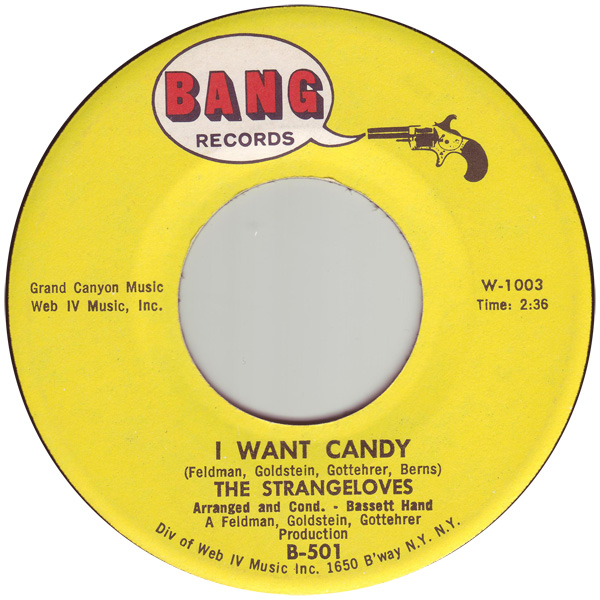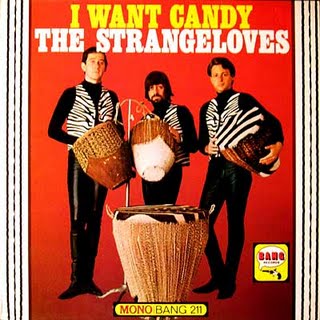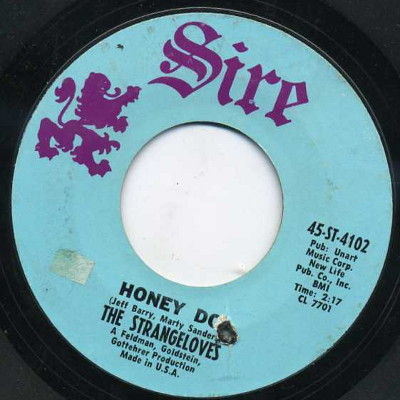
[audio:http://www.paulcollegio.net/juke/juke0503/45.mp3]
This 45 has been in my collection since time immemorial, and until recently, information about it has been totally elusive. The A Side sounds like it could have been used for the theme for a show for teaching language skills to adults; a sexier Sesame Street, what with the ‘Baby, Baby’ interlude and the foot-shufflin’ hip-swingin’ gum-snappin’ pool-shootin’ rhythm. *This* Sesame Street is squarely in the red-light district, and its residents drink & smoke and fuck like bunnies in the backseats of Buicks. And the flipside? Arguably the worst song ever recorded. So the debate began? Lost 45? Or Incredibly Strange Music?
Anyway, the more research I did on this record, the more intriguing it became. All the information I could find was peripheral, but apparently the characters behind Bassett Hand went on to be responsible for music more directly Jukebox Heart-ish. Hence, this Special Report. Oh yeah, here’s that fabulous flip side…

But exactly who is Bassett Hand? An internet search doesn’t yield much. According to the Global Dog Productions discography for Josie Records, this single was released in 1965, along with one other that same year. This coincides with the timeframe for the information below.
A little more digging yielded an entry into the Spectropop Discussion Group archives:
> Does anyone know what the term BASSETT HAND means on Bang Records
> labels?
The liner notes to Robert Feldman’s career retrospective LP “Roots Of
S.O.B.*, Vol. 2” include this dedication (among several others):
“To Richard Gottehrer & Gerald Goldstein: The 2 “G’s in F.G.G., aka
Niles & Giles Strange aka Bassett Hand, etc., etc., thank you for some
of the best years of my life. The memories and the music will always
be there.”
The collection includes two Bassett Hand tracks, “Happy Organ Shake”
and “Soul Paradise,” (the other 45 on Josie) but offers no writing credits for these or any of its other tracks…
A close look at the record labels above will show the FGG team scores writing credits for both the tracks as well. Further investigation links Bassett Hand to many production credits on the famous 1960’s imprint, Bang Records as well as some intersting surprises. The place to begin is with The Strangeloves.
The Strangeloves were the creation of an American songwriting/production team in the 1960s who were from New York but pretended to be from Australia. Their biggest hits were “I Want Candy,” “Cara-Lin” and “Night Time”.
Bob Feldman, Jerry Goldstein and Richard Gottehrer (FGG Productions) had already scored big hits for other artists, including “My Boyfriend’s Back” by The Angels, when they decided to invent The Strangeloves.
According to the press releases, The Strangeloves were three brothers named Giles, Miles and Niles Strange who had grown up on an Australian sheep farm. The brothers’ faked backstory involved getting rich with the invention of a new form of sheep crossbreeding (the long-haired “Gottehrer” sheep, allegedly registered with the Feldman-Goldstein Company of Australia), allowing them the time and financial freedom to form a band. The story did not exactly capture the public’s imagination, but the music still performed respectably on the charts.
When “I Want Candy” became a hit single in mid-1965, the producers found themselves in the unfamiliar and uncomfortable position of performing as live artists. This short-lived experience was followed by a road group composed of four of the studio musicians who had actually recorded these songs. The musicians in the initial road group were bass player / vocalist John Shine, guitarist Jack Raczka, drummer Tom Kobus and sax player / vocalist Richie Lauro. This group was replaced in early 1966 by a trio of FGG studio musicians that more closely adhered to the founding concept of the Brothers Strange: guitarist Jack Raczka (Giles Strange), drummer / vocalist Joe Piazza (Miles Strange), and keyboardist / vocalist Ken Jones (Niles Strange).
While on the road in Ohio in 1965 as The Strangeloves, Feldman, Goldstein and Gottehrer came upon a local band known as Ricky Z and the Raiders, led by Rick Derringer (who was Rick Zehringer at the time). Recognizing their raw talent, the producers immediately brought Rick and his band to New York, recorded Rick’s voice over the existing music track from The Strangeloves’ album I Want Candy and released “Hang on Sloopy” as a single under the name The McCoys.
The Strangeloves’ only LP, I Want Candy, was released in 1965 on Bert Berns’ Bang Records, with several of the album songs having been released as singles. Other singles by The Strangeloves have appeared on Swan Records and Sire Records.
Their songs have been covered by The J. Geils Band, The Fleshtones, and (with great pop success) by Bow Wow Wow.
Gottehrer went on to later fame as a record producer of early CBGB’s luminaries such as Richard Hell & The Voidoids, The Fleshtones, and Blondie, as well as being the co-founder of Sire Records along with Seymour Stein. He also worked with Robert Gordon, who was one of many who revitalized rockabilly in the late 1970s.
In his role as a producer and manager, Goldstein also continued to have an effect on the music world. He suggested to the band Nightshift that they team up with Eric Burdon, which became War, and had the Circle Jerks on his Far Our Productions management company and LAX record label.
The following credit appears on every Strangeloves record: “Arranged and Conducted by Bassett Hand.” In fact, there is no such person as “Bassett Hand.”
Fascinating.
Some more photos for my collector geek buddies:
Note the Bassett Hand credit:

And a picture of the band from the LP jacket:

Most recognize the yin/yang design of Sire Records from the late 70s and later.
Here is an early Sire Records label design:

